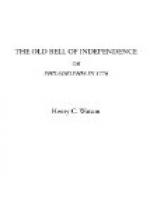“They had not got far from the island, when the discharge of cannon and three sky-rockets gave the signal of alarm. It was fortunate for the party that the enemy on board the shipping were ignorant of the cause of it, for they might easily have cut off their retreat. The signal of alarm excited the apprehensions of Major Barton and his brave associates, and redoubled their exertions to reach the point of their destination before they could be discovered. They succeeded, and soon after day-break landed at Warwick Neck, near the point of their departure, after an absence of six hours and a half.
“General Prescott turned towards the island, and, observing the ships of war, remarked to Major Barton, ’Sir, you have made a bold push to-night.’ ‘We have been fortunate,’ replied the hero. An express was immediately sent forward to Major-General Spencer, at Providence, communicating the success which had attended the enterprise. Not long afterwards, a coach arrived, which had been despatched by General Spencer to convey General Prescott and his aide-de-camp prisoners to Providence. They were accompanied by Major Barton, who related to General Spencer, on their arrival, the particulars of the enterprise, and received from that officer the most grateful acknowledgments for the signal services he had rendered to his country.”
“I suppose Prescott paid for Lee soon afterwards?” said young Harmar. “Yes; he was an officer of equal rank with Lee. The enemy had refused to exchange Lee for two or three officers of an inferior grade, but they were ready enough to take Prescott for him,” replied Morton.
“It was as complete an enterprise as was ever carried through,” remarked old Harmar.
“The poor general must have been surprised to find he was a prisoner, when he thought himself safe among an army and fleet,” observed Mrs. Harmar.
“Major Barton was every inch a hero. See his skill and daring in planning and executing the capture, and then his modesty when Prescott said he had made a bold push—’We have been fortunate.’ The reply was worthy of the noblest of the Athenians,” remarked Mr. Jackson Harmar.
“Circumstances did certainly favor the enterprise,” said Smith. “In fact, we may say its success turned upon chances, and if it had failed and the whole party been made prisoners, Major Barton would have been called a rash and inconsiderate officer. Success works wonders in our estimate of deeds.”
“You are harsh. Barton calculated the chances before he entered into the expedition—saw that they were in his favor, and then formed his plan. I am persuaded that, had he failed, his countrymen would have done him justice,” said Wilson.
“Perhaps,” replied Higgins.
JONATHAN RILEY AND FRANK LILLY.
“I say, Mr. Higgins,” said old Harmar, wishing to change the subject, “do you recollect Jonathan Riley and Frank Lilly, that were in our company?”




